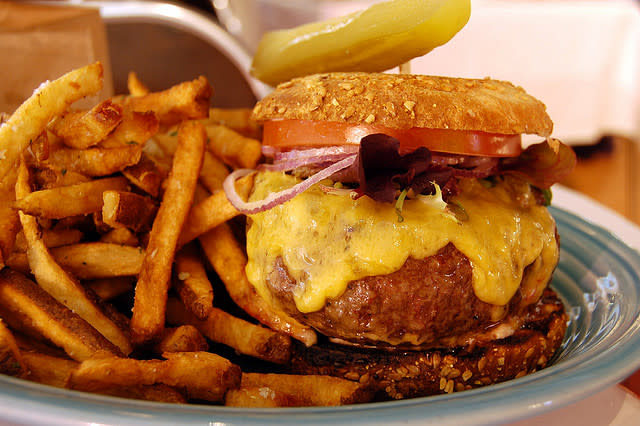Understanding Nutrition – Fats, Proteins and Carbohydrates
Nutrients play an important role in our diet and we need all of them, including fats, proteins, carbohydrates, vitamins and minerals
Fats

(photo: Phil Campbell)
Fats are part of a healthy diet. The key is to make smart decisions when it comes to choosing which fats and oils you are going to eat. This means substituting saturated fats with unsaturated fats. Also, opt for lighter oils when cooking.
Fats are essential for supplying the body with energy, and they contain nine kilocalories per gram, twice that of carbohydrates and proteins. Fats are required for the transportation of fat-soluble vitamins around the body. These fat-soluble vitamins include:
Vitamin A
Vitamin D
Vitamin E
Vitamin K
Carotenoids
Fats are also the building blocks for many tissues and membranes. They play many roles such as the protection of internal organs as well as the formation of hormones.
The type of fat that you consume makes a huge difference. Fats come in three forms: saturated, monounsaturated and polyunsaturated. A diet that is high in saturated fats, cholesterol and trans fats have been associated with numerous conditions including:
Heart disease
Heart attacks
Stroke
Chronic health problems
Diabetes
Obesity
Excessive fat intake of saturated fats and trans fats are associated with the greatest complications. Trans fats are those fats that are solid at room temperature. In a six-year study of trans fat, monkeys on a low calorie diet who obtained their calories from trans fat still had weight gain. Trans fat redistributes body fats moving them towards the abdomen area resulting in fatter tummies, One of the best ways to limit the intake of saturated fat is to limit the intake of animal fat in the diet. Animal fats include meats such as:
Bacon
Sausage
Butter
Ice cream
Cholesterol can be regulated by watching the intake of eggs and organ meats such as pork liver.
Polyunsaturated and monounsaturated fats are better choices. These can be found in canola and olive oil. Incorporate these lighter oils into your diet instead of using fats such as lard to cook with. These fats are liquid at room temperature. They also have heart-protecting qualities, unlike trans fats.
Fish also contains good fats. They are a source of omega-3 fatty acids. These have been found to help lower cholesterol and to promote good health.
Dietary fat is available in both plant and animal sources of food. The Health Promotion Board recommends that the intake of fat should be kept to 20 to 30 percent of calories with one third or less of it being saturated fats. Extremely low fat diets, however, are not safe and have been known to lead to fatigue, poor concentration and metabolic disorders.
Proteins
Proteins are another source of fuel, providing four kilocalories per gram. Responsible for blood cell formation, tissue repair and immune response, it is essential for body growth and maintenance.
Proteins too, come in multiple forms. Complete proteins come with all the essential amino acids needed by our body. Great sources of complete proteins come mainly from animal-based foods, such as meat, milk, poultry, fish and cheese. Incomplete proteins lack one or more of the essential proteins. Sources of incomplete protein come from rice, beans, nuts and soy products.
The main thing to take note of when choosing your proteins is to pay attention to the whole package, as recommended by the Harvard School of Public Health. While a serving of steak provides 40 grams of proteins along with it is 38 grams of fats, salmon on the other hand offers 34 grams of proteins with only 18 grams of fats. Make your choice not simply based on the amount of protein a food item provides, but its overall health value.
Fish allows you to maximize protein while keeping fat and calories low. This is why fish is great for those who are trying to lose weight and enjoy a healthier diet. There are very few foods capable of combining low fat and low calories, and still have high protein.
According to the Recommended Daily Intake, proteins should make up 10 to 35 percent of your calories intake.
Carbohydrates

(photo: stu_spivack)
Carbohydrates are the primary source of fuel we use. They are found in a variety of foods including fruits, vegetables, grains and dairy products. However, they are not all equally healthy, so it is important that you choose wisely. For instance, cookies and whole wheat bread are both sources of carbohydrates, but whole wheat bread is much healthier than cookies.
Choose bread and cereals made with whole grains. Avoid the highly refined varieties. In addition to cereals and breads, other good sources of carbohydrates include fruits, vegetables, legumes and peas. Eat a large variety of carbohydrate food sources to keep your diet interesting.
Many people consume way too much sugar and salt to supplement their carbohydrate staples like rice or bread. Limit the intake of accompanying sugar as much as possible. Consuming large amounts of these low nutrient and high calorie foods can make it difficult to stay healthy without gaining weight. Salt is important in nutrition, but many people consume too much of it. Excess salt causes water retention, high blood pressure and other conditions. Choose low sodium foods and limit the use of the saltshaker.
When it comes to choosing carbohydrates opt for sources with a low glycemic index (GI). Glycemic index is the measure of increase in blood glucose level from the consumption of carbohydrates. Foods with high GI send sudden spikes of glucose to your blood stream, giving you a sugar rush. However after the effects of the rush, you will experience a dip in your glucose level resulting in fatigue as well as hunger. Low GI foods on the other hand provide you with a slow and steady source of glucose to last you through longer periods without making you feel bloated. Foods with low GI include fruits, nuts, vegetables and grains.
Via HealthMatters.sg, a Singapore Health and Fitness blog that aims to help you lose weight, keep fit, and live healthy. Click here to get our free guide “Eat Your Way to Health – Secrets of a Healthy Diet”.
Related Articles
5 Keys to Selecting the Right Personal Trainer (at HealthMatters.sg)
Beyond Fad Diets – Eating for Maximum Nutrition (at HealthMatters.sg)


